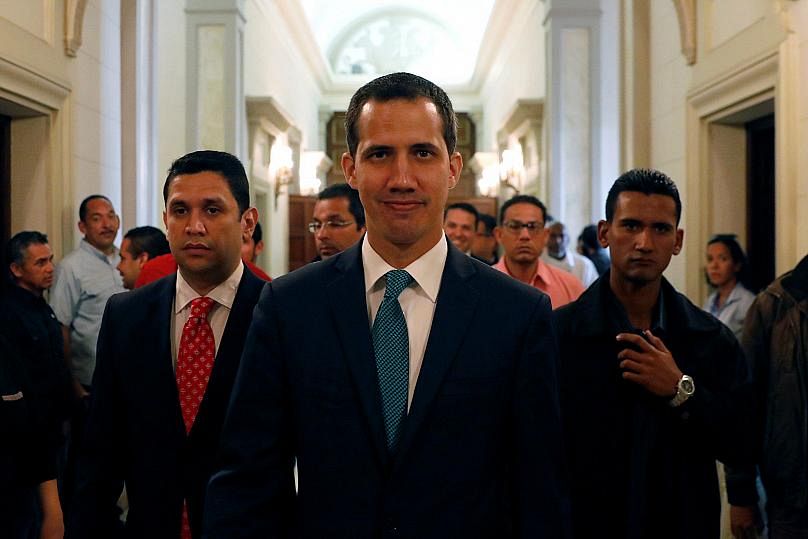In Venezuela, "a game of chess underway to force a transition," according to Rafael Grasa, an expert in international relations. But what are the practical implications of European countries recognising Guaido as president in the Latin American country?
More than a dozen European countries on Monday recognized Juan Guaido as president of Venezuela, turning their backs on Venezuela's incumbent president, Nicolas Maduro.
The announcement came at the end of an eight-day ultimatum from Spain, France and the United Kingdom, among other countries, calling for presidential elections in Venezuela.
Maduro accused the nations of being colonialist and of bowing to the strategy of the United States.
Euronews spoke to Rafael Grasa, an expert in international relations, to see what the practical consequences of these announcements were in Venezuela.
"The golden rule in Latin American diplomacy, established more than a century ago, is called the Estrada Doctrine: States are recognized, not governments," said Grasa, highlighting that the situation in Venezuela was nuanced and not the norm in the area.
Who is the legitimate president of Venezuela?
An interim president has been recognised — in charge, constitutional, and legitimate... Various points of leverage are being presented in addresses, which indicates Guaido and his supporters are trying to force Maduro out.
"We are facing a political and diplomatic situation, not a fundamentally juridical situation," said Grasa.
In Venezuela, "a game of chess underway to force a transition."
Will ambassadors be fired?
When the US recognized Guaido, Maduro's government made a request for the withdrawal of diplomats that, according to Grasa, "has only partially been carried out". Guaido has appointed ambassadors to fifteen countries since January 24.
Asked about the possibility of withdrawing the accreditation of the current Chavista Venezuelan ambassador, Spanish Minister of Foreign Affairs and Cooperation Josep Borrell answered vaguely that "more events will happen in the coming days."
For Grasa, the withdrawal of embassies from Venezuela would be contrary to the objective of the European countries that have recognized Guaido, which is to force a transition that leads to democratic elections.
"At the moment there is is a diplomatic pulse, which going to mean embassies are not closed," said Grasa.
Preventative measures are currently being carried out — the Spanish embassy in Caracas has concentrated its staff in its headquarters and expanded security measures, dispatching a division of elite agents.
"Over the coming days, and probably over the coming weeks, we aren't going to see a massive departure of diplomats," said Grasa.
Will bilateral agreements be cancelled?
Maduro's government responded to the European recognition of Guaido as president with a communiqué in which it warned that it will "comprehensively review bilateral relations with those governments."
Grasa said that the uncertainty surrounding the future of bilateral treaties with European countries is not a priority for the Chavista Executive.
One of the key countries for the Venezuelan economy is the United States and its relationship with Venezuela changed in the wake of Trump's recognition of Guaido.
The US is the top supplier of foreign currency to Venezuela and has said money will now go directly to Guaido, explained the expert.
Concerning oil exports, he said: "Obviously Maduro's government is not going to send more barrels of oil to the United States, because there is no guarantee it will collect them."
Russia, China and Turkey are the key countries contributing to the daily upkeep of Maduro's government, and "all three have clearly stated that they support the regime or at least have said that (recognizing Guaido) was considered interfering in the internal affairs of another nation," said Grasa.
"Let's not forget that there is a fundamental geopolitical issue — at a time when the international system is changing, Venezuela is the place where a connection is being achieved between the Western world, with a key role played by the United States, and a certain Eurasian arc, between Russia and China."
What are the possible future scenarios?
- Guaido's recognition was premature and transition of power doesn't happen: Giving the example from 2011 when Barack Obama asked Bashar al-Assad step down as president in Syria and pushed for a transition, Grasa said: "Finally, the United States had to leave that path and today we know that Asad's power was consolidated."
- The transition happens: The fact that Guaido has vocal and visible supporters works in his favour, according to Grasa, but he would have to maintain this. Also positive for the 35-year-old — he is a young leader "that is not linked to internal quarrels and problems".
"We're on a road that could end with bloodshed, 50 people already died," he warned.
This will depend on what happens with a humanitarian plan that has been set in motion and military desertions.
Trump and his insistence on military intervention is the most critical destabilising factor that could impact the situation, said the expert.
What happens if the situation with two presidents turns sour?
For Grasa, this would be a fundamental problem: "If the situation drags on, humanitarian aid cannot be distributed.
"If the Maduro regime perceives that no exit has been agreed with a certain level of impunity, or there are clashes in the streets, this would be very risky."
He added that in politics and diplomacy, states are held hostage by what they say: "We have seen that words led to the Guaido regime being recognised.
"This is as important as other elements, but won't necessarily lead to an eventual transition."












